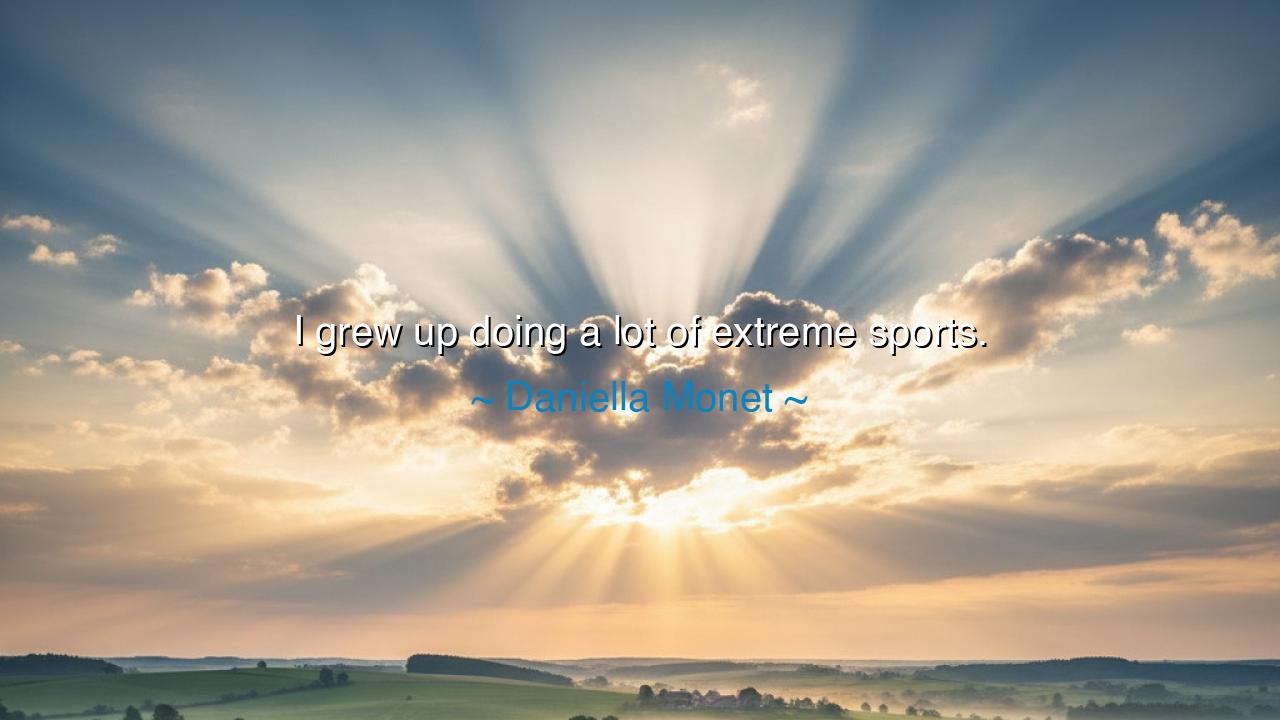
I grew up doing a lot of extreme sports.






In the utterance, “I grew up doing a lot of extreme sports,” Daniella Monet unveils not merely a fact about her youth, but a philosophy of existence. To say she “grew up” this way is to confess that her character was forged not in comfort or leisure, but in the wild winds of daring and danger. The ancients would have called such a life a training ground of the soul, where one learns through trial what no book nor scroll could ever teach. For in extreme sports, there is speed, there is risk, there is the constant confrontation with fear—and in overcoming fear, there is the birth of strength.
Consider the meaning of this: every time a young spirit launches into the unknown, leaping from cliffs, racing down steep slopes, or balancing upon the edge of disaster, the heart becomes tempered like iron placed in fire. What Monet recalls is not only her youthful joy, but the crucible that shaped her will. For the human being who embraces challenge does not shrink from the storms of life later on; rather, they meet them with a calm and steady gaze, saying, “I have known worse, and I endured.”
The history of mankind itself is filled with such lessons. Recall the tale of the Greek youth Milo of Croton, who each day lifted a calf until it grew into a bull. To others, such labor seemed folly, but through slow and daring persistence, Milo gained a strength no other man could match. Though not a sport of cliffs or oceans, his training carried the same spirit—of risking, of straining, of stepping into the extreme. For the extreme is not always measured in the peril of the environment, but in the courage to push beyond the ordinary.
There is also a quieter wisdom here: extreme sports are not solely about the body, but about the shaping of spirit. When one rides waves taller than a house or descends a mountain at reckless speed, the senses awaken. The mind sharpens, the breath steadies, and the soul whispers, “Live now, for tomorrow is uncertain.” It is this heightened awareness that Monet carries from her youth, a gift far greater than trophies or medals.
Yet let us not mistake this lesson for recklessness. Even the bravest of warriors of old knew that daring must be married to discipline. Alexander did not ride into battle without strategy; nor did Odysseus sail without cunning. Likewise, in extreme sports, balance, preparation, and respect for the forces of nature are as vital as courage itself. The wise understand that the purpose of daring is not to seek death, but to grasp life more fully.
So what then shall the listener take from these words? You need not leap from cliffs or race upon mountain trails to learn their essence. Rather, let your life itself be your extreme sport. Dare to speak when silence is easier, to love when indifference is safer, to create when destruction surrounds you. Seek the edge of your comfort, for there, and only there, will you discover what you are truly made of.
Take as your daily practice this action: each day, attempt something that stirs your fear, however small. Walk into that difficult conversation you have avoided. Try the skill that humbles you. Speak the truth that trembles in your chest. Like the youth lifting the calf, or the athlete braving the waves, each small act of daring becomes a stone laid upon the path of your becoming.
Thus, Daniella Monet’s reflection is more than memory; it is a beacon. “I grew up doing a lot of extreme sports,” she says, but what she truly means is: “I grew up learning courage.” Let us then grow likewise, not in the ease of still waters, but in the rushing river of challenges. For in that river, the soul is made alive, and life becomes not a burden to endure, but an adventure to embrace.






AAdministratorAdministrator
Welcome, honored guests. Please leave a comment, we will respond soon